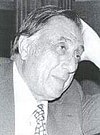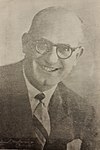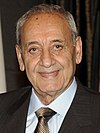
A member of parliament (MP) is the representative in parliament of the people who live in their electoral district. In many countries with bicameral parliaments, this term refers only to members of the lower house since upper house members often have a different title. The terms congressman/congresswoman or deputy are equivalent terms used in other jurisdictions. The term parliamentarian is also sometimes used for members of parliament, but this may also be used to refer to unelected government officials with specific roles in a parliament and other expert advisers on parliamentary procedure such as the Senate parliamentarian in the United States. The term is also used to the characteristic of performing the duties of a member of a legislature, for example: "The two party leaders often disagreed on issues, but both were excellent parliamentarians and cooperated to get many good things done."
A presidency is an administration or the executive, the collective administrative and governmental entity that exists around an office of president of a state or nation. Although often the executive branch of government, and often personified by a single elected person who holds the office of "president", in practice, the presidency includes a much larger collective of people, such as chiefs of staff, advisers and other bureaucrats. Although often led by a single person, presidencies can also be of a collective nature, such as the presidency of the European Union is held on a rotating basis by the various national governments of the member states. Alternatively, the term presidency can also be applied to the governing authority of some churches, and may even refer to the holder of a non-governmental office of president in a corporation, business, charity, university, etc. or the institutional arrangement around them. For example, "the presidency of the Red Cross refused to support his idea." Rules and support to discourage vicarious liability leading to unnecessary pressure and the early termination of term have not been clarified. These may not be as yet supported by state let initiatives. Contributory liability and fraud may be the two most common ways to become removed from term of office and/or to prevent re-election.
A constitutional convention is an informal and uncodified tradition that is followed by the institutions of a state. In some states, notably those Commonwealth of Nations states that follow the Westminster system and whose political systems derive from British constitutional law, most government functions are guided by constitutional convention rather than by a formal written constitution. In these states, actual distribution of power may be markedly different from those the formal constitutional documents describe. In particular, the formal constitution often confers wide discretionary powers on the head of state that, in practice, are used only on the advice of the head of government, and in some cases not at all.
President of the Senate is a title often given to the presiding officer of a senate. It corresponds to the speaker in some other assemblies.

The president of Malta is the constitutional head of state of Malta. The president is indirectly elected by the House of Representatives of Malta, which appoints the president for a five-year term and requires them to swear an oath to "preserve, protect and defend" the Constitution. The president of Malta also resides directly or indirectly in all three branches of the state. They are part of Parliament and responsible for the appointment of the judiciary. Executive authority is nominally vested in the president, but is in practice exercised by the prime minister.

The speaker of a deliberative assembly, especially a legislative body, is its presiding officer, or the chair. The title was first used in 1377 in England.

The prime minister of Lebanon, officially the president of the Council of Ministers, is the head of government and the head of the Council of Ministers of Lebanon. The prime minister is appointed by the president of Lebanon, with the consent of the plurality of the members of the Parliament of Lebanon. By convention, the office holder is always a Sunni Muslim.

The State of Greater Lebanon, informally known as French Lebanon, was a state declared on 1 September 1920, which became the Lebanese Republic in May 1926, and is the predecessor of modern Lebanon.
The National Pact is an unwritten agreement that laid the foundation of Lebanon as a multiconfessional state following negotiations between the Shia, Sunni, and Maronite leaderships. Erected in the summer of 1943, the National Pact was formed by the then-president Bechara El Khoury and the prime minister Riad Al Solh. Mainly centered around the interests of political elites, the Maronite elite served as a voice for the Christian population of Lebanon while the Sunni elite represented the voice of the Muslim population. The pact also established Lebanon's independence from France.
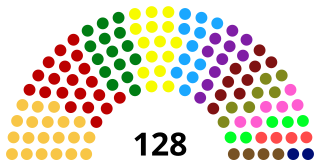
The Lebanese Parliament is the national parliament of the Republic of Lebanon. There are 128 members elected to a four-year term in multi-member constituencies, apportioned among Lebanon's diverse Christian and Muslim denominations but with half of the seats reserved for Christians and half reserved to Muslims per Constitutional Article 24. Lebanon has universal adult suffrage. Its major functions are to elect the President of the republic, to approve the government, and to approve laws and expenditure.

The presidentof the Lebanese Republic is the head of state of Lebanon. The president is elected by the parliament for a term of six years, which cannot be renewed immediately because they can only be renewed non-consecutively. By convention, the president is always a Maronite Christian who fulfills the same requirements as a candidate for the house of representatives, as per article 49 of the Lebanese constitution.

The Speaker of the National Assembly ; informally as Speaker National Assembly, is the presiding official of the National Assembly of Pakistan– a lower house of the Parliament of Pakistan.

Lebanese Independence Day is the national day of Lebanon, celebrated on 22 November in commemoration of the end of the French Control over Lebanon in 1943, after 23 years of Mandate rule.
Confessionalism is a system of government that is a de jure mix of religion and politics. It typically entails distributing political and institutional power proportionally among confessional communities.

The Speaker of the Parliament of the Democratic Socialist Republic of Sri Lanka is the presiding officer of the chamber. The current Speaker of the Parliament is Mahinda Yapa Abeywardena, in office since 20 August 2020. The Speaker fulfills a number of important functions in relation to the operation of the House, which is based upon the British Westminster parliamentary system.

Sabri Hamadeh, also written as Sabri Hamadé or Hamada (1902–1976) was a Lebanese politician and long-time Speaker of the Lebanese Parliament.

The Federal Parliament of Somalia is the national parliament of Somalia. Formed in August 2012, it is based in the capital Mogadishu and is bicameral, consisting of an Upper House (Senate) and a Lower House.
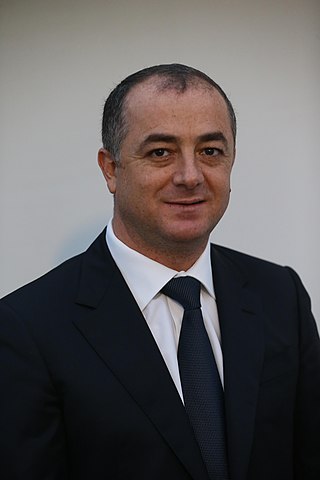
The Deputy Speaker of the Parliament of Lebanon is the second highest-ranking official of the Lebanese Parliament.











